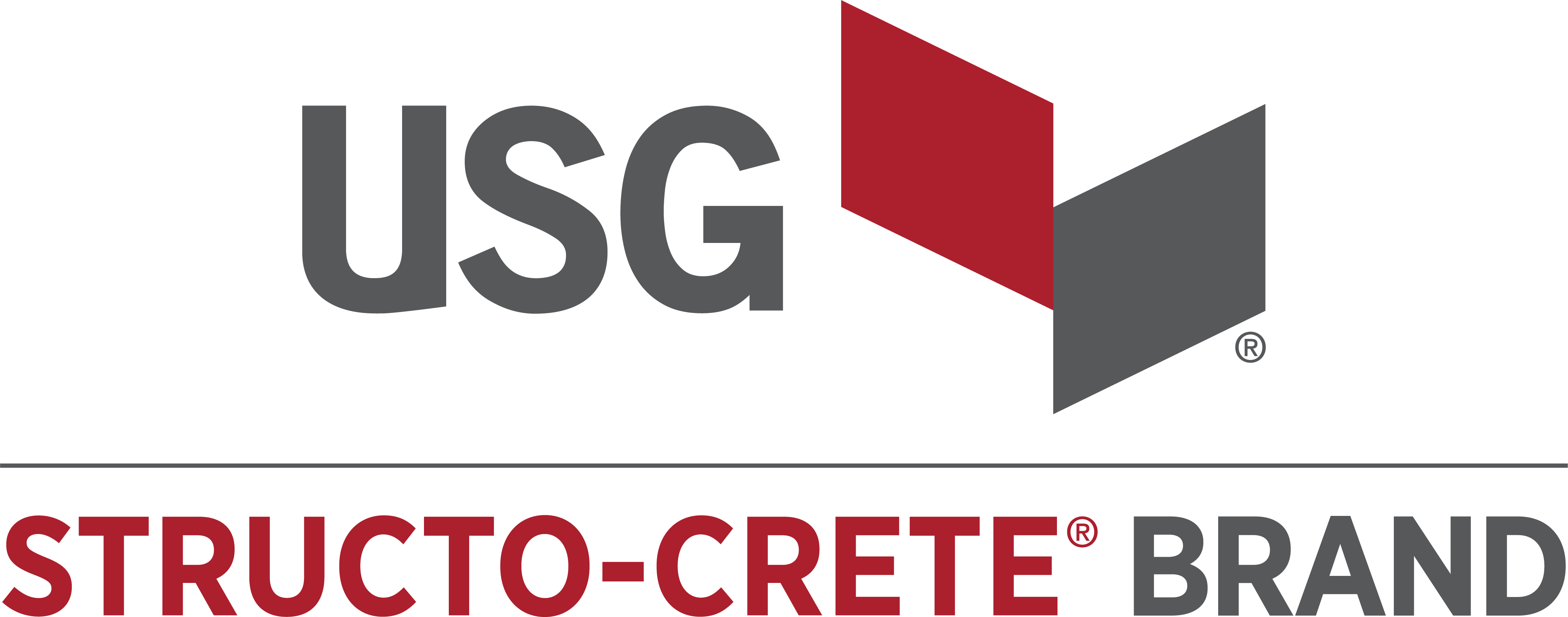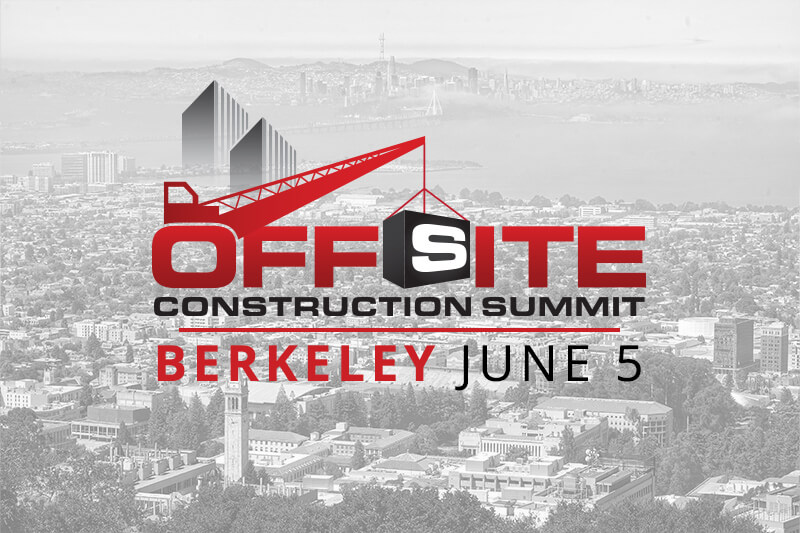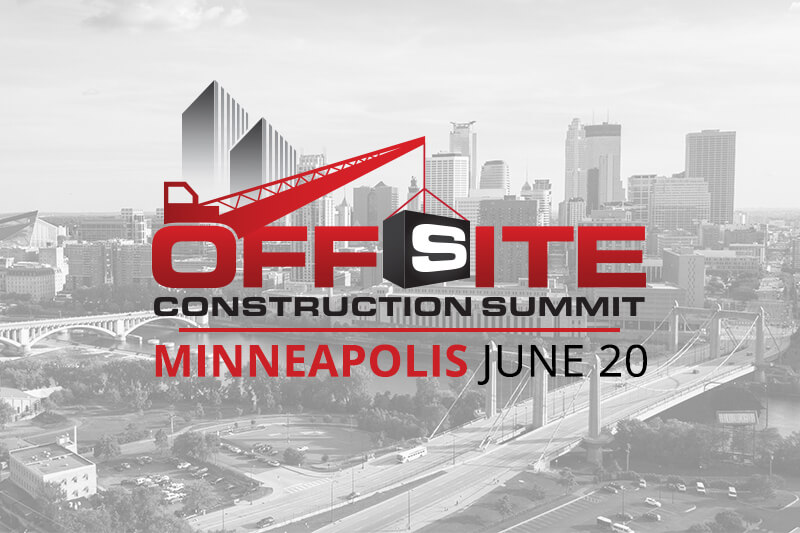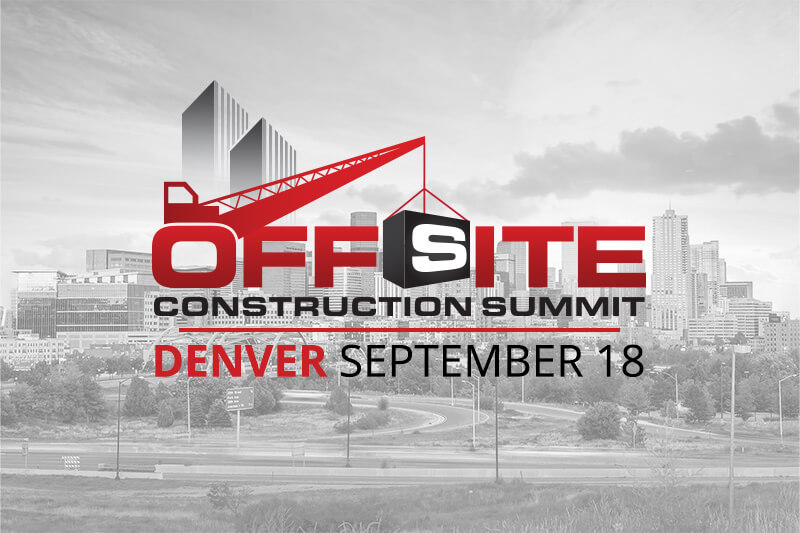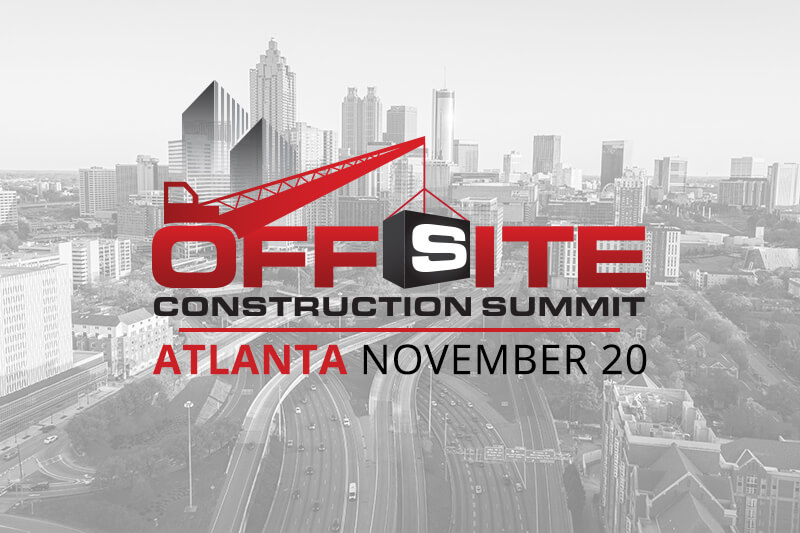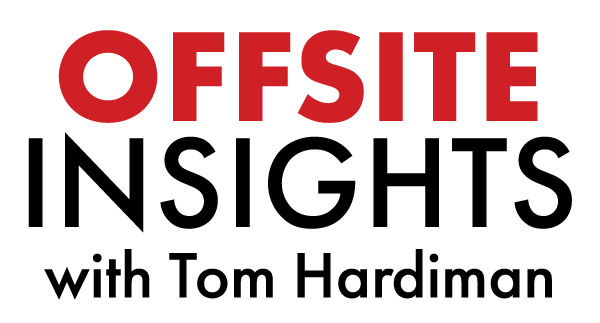
The Importance of Design Teams in the Offsite Development Process
An interview with Shawn Lothrop, CEO, Innovative Structural Engineering
Shawn Lothrop, CEO of California-based Innovative Structural Engineering, talks with Tom Hardiman about the growth of the modular and offsite construction industries and the critical role an experienced design team plays during the development of an offsite construction project.
Interview transcript
Tom Hardiman
I'd like to thank today's sponsor for Offsite Insights, USG Structo-Crete Brand structural panels are noncombustible mold moisture termite resistant, dimensionally stable panels for use and sub floor, roof deck or foundation wall assemblies. Structo-Crete Brand structural panels meet the full criteria of ASTM E 136 for use in all types of noncombustible construction. Numerous one, two and three hour fire designs are available for modular panelized and conventionally constructed buildings to meet virtually any application. The panels are easily cut with standard framing tools, rapidly applied using mechanical fasteners and require no adhesive free installation. To learn more, visit www.usg.com/structocrete.
Hello and welcome to another edition of Offsite Insights. I'm your host Tom Hardiman. And I'm joined today by Mr. Shawn Lothrop, who is the CEO of Innovative Structural Engineering in California. Shawn, how are you doing today?
Shawn Lothrop
Good, Tom. Thank you for having me on. Appreciate it.
Tom Hardiman
Well, thank you. Thank you for joining me. California-based…I think you're somewhere in between Los Angeles and San Diego. Right at about the midway point?
Shawn Lothrop
Yeah, yeah, we're in Temecula, California. It's we get the ability to serve San Diego, LA, and Inland Empire and all the other counties around us. So, it's, uh, we like where we're at. It's good spot.
Tom Hardiman
Absolutely. Well, I'm a little bit of a baseball fan. So I have to ask: are you a Dodgers fan? Padres fan? Neither?
Shawn Lothrop
Unfortunately, Angels fan. And they were really struggling right now. But…
Tom Hardiman
They got some great players, though.
Shawn Lothrop
Yeah, good players. And just the record is not showing it. So…We're hanging in there.
Tom Hardiman
Well I’m a Pirates fan. So I've gotten no room to talk. So there you go.
But that's not why we're here. Sean, we want to talk a little bit about you and your company and what you guys are doing in the modular and offsite space. So why don't we start there. Tell us a little bit about your background, who you are. And then a little bit about your company.
Shawn Lothrop
Yep. Thank you so much. So I'm a licensed structural engineer. I'm started my career in California. But I've worked on site build modular, all types of different structures. I've been in the industry burned about 25 years, maybe a little bit longer. I'm currently licensed about 35 states all over the West. So we do work nationwide. And as you mentioned, I'm the CEO, but I'm also one of the CO owners of ISE. And ISE has three offices, two in California and one in Denver, Colorado. And we employ about 30 engineers. And yeah, it's been a great time, the industry to be working right now. And in watching modular takeoff and watching prefabricated construction really grow. So it's been wonderful.
Tom Hardiman
Well, you know, I think in large part it's taking off because we're getting more engineers and architects and designers involved in our space. So thank you for being part of this.
Shawn Lothrop
Yeah, no, thank you.
Tom Hardiman
Well, let's kind of go back maybe that first modular project you ever worked on? Can you tell us a little bit about that what it was, like? Good, bad or ugly?
Shawn Lothrop
Yeah, it's been a lot of years. I think the first projects I've worked on was probably back in 2004. For Barbista Homes back at that time, and it was just a single-family custom home. And that really opened my eyes to different ways to construct things offside. And it really for me, it was the starting point to really get into something that we found very interesting. And yeah, it was a great opportunity.
Tom Hardiman
Looking back on that anything…lessons learned…anything you would have done differently? Turn and ran? Or just sounds like you really just embraced the whole thing.
Shawn Lothrop
Yeah, no, it was great. I mean, I think the challenging part was, you know, the rest of the industry is not as experienced in modular and prefab, especially back in 2004. It wasn't as with say, more mainstream, back then that was the biggest challenge. But you know, and understanding submittal requirements, and you know, that the state does one plant check and the city does the other and, and it that was a little challenging in the beginning, but I don't think how to really change much and that kind of stuck with the same type of design and similar systems since then.
Tom Hardiman
About how many modular projects do you think or estimate your firm is or you've worked on over the years?
Shawn Lothrop
Quite a few I would say we've been close to maybe 100-plus projects between single family homes to apartment buildings, schools, hospitality, we've done some medical office buildings. We've had a pretty diverse experience with a lot of different material types to with wood and cold form hot-rolled steel. A lot of different types of materials. Yep.
Tom Hardiman
Excellent. So, maybe shifting gears a little bit: You know, our industry, we're, you know, I've been involved for nearly 20 years. 2004 is when I started here with MBI. And we're always trying to grow the industry, but there's always these barriers and challenges out there. What are some of those that whether they're real or perceived that you hear you come across on a regular basis?
Shawn Lothrop
I think when I first started the industry, you know, the, the modular volumetric industry had a reputation as being more, you know, HUD style, mobile home kind of stuff. And it's really transitioned a lot in the last, say, 20 years.
You know, I really agree that there are a lot more qualified people in the industry, a lot of, say, even site built related people that have come over to the prefab prefabricated side and understanding that, that prefabrication and modular volumetric modular grade solutions, I think they both have their own solution for different projects. But I think, you know, the owner really is something that needs to get involved in understanding, you know, how each one fits. But, but yeah, I mean, it's been wonderful to watch the industry grow and see the qualified people come into it and really see it take off.
Tom Hardiman
I think one of the biggest changes I've seen over the past 5, 6, 7 years is, when I started, you're exactly right, I was told, “If anyone has ever heard of us, it's probably not good. It's probably a negative perception.” So that was kind of the first thing we had to work on.
But really the last five or six years, what I'm seeing, and what we're seeing is, it's not either a modular project or a site build, but very much, you know, a hybrid or team approach and modular works in some parts of the project. So we are seeing more of this integration of the modular process into, I guess, mainstream construction, if you will.
Shawn Lothrop
Yeah, we see a lot of combination of both on projects, volumetric and prefabrication.
Tom Hardiman
Yeah. So I just saw something. Yesterday, I think that said, “Congratulations, San Francisco, you are now the most expensive city to build in, on the planet.” San Francisco.
Shawn Lothrop
That's a new thing? [Laughter]
Tom Hardiman
Well, I think it was like number two or three before, but they passed Tokyo. So you know, we do a lot of work. We have a lot of members in California. And we're really trying to position the industry to address housing a little better. It's, it's a huge problem everywhere, but I think it's really amplified in California. And do you have much experience with housing projects in that Bay Area? Or is that just…
Shawn Lothrop
Yeah, yeah, I mean, we have, I would say we have three or four apartment on podium projects in, in and around like Oakland and different areas for the North. And a lot of it is labor shortage. And, yeah, it is so expensive to find trades in those areas that, you know, bringing in these prefabricated pieces from outside. It's just an easier way to build. So yeah, then those areas? Definitely we see a lot of it. Yeah.
Tom Hardiman
Yeah, I think New York City was in the top five. So I mean, that's to me, where I would see big opportunities for our industry is, if you can prefabricate some of the work a little bit further outside city limits and bring it in. Maybe we've got good opportunities there in some of these large urban areas.
Shawn Lothrop
Yes, San Diego, for example, we have I want to say five or six apartment-on-podium projects going right now, in design and under construction. So there's, yeah, there's a need.
Tom Hardiman
You guys are busy. Yeah. So imagine you've worked with a lot of developers? Do you? Do you typically as your typical customer, a repeat customer, a developer that are an agency or organization that you've done multiple projects with? Or is it somebody new to modular that you have to educate a little bit?
Shawn Lothrop
No, I would say it's a combination I think a lot of our repeat business is working with specific factories that have a specific they want way they want to build and we know their standards really well and in work with them. And then on the other angle, we have another client that is the owner, owner of the property owner the construction company and factor in their building several large apartment projects as an owner builder, factory-type situation. But then we do see the one off, you know, we have a client in LA that's building a modular project where he's actually building the modules on a site near the near the job site and they're and they're shipping down the street.
So, I think there's a lot of a lot of different ways for people to get involved in modular and prefabricated methods and you know, is creative as some of the clients can be and owners can be I think the industry is willing to adapt and really make it work for the projects as the owner, you know, need the owner have obviously different needs on every project. So it's a very flexible industry.
Tom Hardiman
Well, that was the other thing I was going to say has changed quite a bit is there doesn't seem to be, you know, a one size fits all, this is the way you do this. Every project…We've seen a lot of different methods from owner developers deciding they're going to open their own factories, we've seen some of that. We've seen general contractors open their own modular divisions; we've seen modular manufacturers, you know, scale up and become the GCs on projects. There doesn't…we are very flexible, I think. And there hasn't been one best way emerge, which is fine.
Shawn Lothrop
And I think, you know, the industry as a whole has talked a lot about standardization. And I think that has it's a, you know, there's an ability to standardize, I think with clients, but trying to step standardize, as factories. And that becomes a challenge, I think, because one product may not necessarily work for another client and that so there still has to be flexibility, but then trying to standardize the methods of construction, I think, would definitely really help the industry. I think so.
Tom Hardiman
Yeah. And that's, you know, that's absolutely agree with you, we are working on standardizing the areas that make sense to standardize, and that is the inspection process, the quality control process, some of the processes on the front end, not necessarily the product on the back end. But some of those…we have two standards we've worked on with the International Code Council now on, you know, how do modular buildings get reviewed, approved, and inspected? And it's different in every state. So those are some of the things we're trying to standardize here.
Shawn Lothrop
Great efforts. Yeah, for sure.
Tom Hardiman
So, um, if someone just came to you off the street, or you're at a party somewhere, I have heard about this modular thing, and I want to build it what advice would you give a new-to-modular developer?
Shawn Lothrop
That's a good question. I think what I've realized is that getting a design team, you know, coming from me, as a structural engineer on the design professional side, I really feel like hiring a well experienced design team that is your team, for the site-built and factory-constructed portions, is a big help. And getting those the team members involved as early as possible in the process to help plan the site, plan, the product plan, really go through the whole planning process to really try to prevent some of the…we see a lot of clients that maybe have already designed a product for site building, they come in, and they want to make it modular, which can be done, it has some restrictions.
But we really feel like you know, hiring the design team early to start the planning of an upside product project early on is really the best way to go. So that would be the one thing I think is I see over and over with clients.
Tom Hardiman
I think you're right on there. We've heard stories of those projects where they're designed to be site built, the bids come in, they're too high. So they decide let's go modular and save some money. And those usually don't work out.
So yeah, I agree with early, you know, make that decision, early, early communication, commit to it. Excellent. Well, any cooler exciting things you guys are working on these days or anything at that beautiful beach background you have there that we can come visit?
Shawn Lothrop
I mean, in San Diego, like I mentioned, we have, I want to say five or six projects going on right now. They're all five-storey wood products on two storeys, or a St. One level or two levels of parking below. They're all concrete podium. Yeah, I mean, there's a few like we have, you know, different types of projects coming all the time. And I want to make it sound like apartments are really the only viable product out there. But you know, we have a golf course, clubhouse that's coming in, that we're working on. And we have medical office buildings for LA County that we had done and actually had a nice Medical Center at MLK. Hospital in LA. So there’s a big variety of things that modular and prefabricated can be used on and we actually have several schools going on in the Bay Area as well that are prefabricated in that so…it's yeah, we got some exciting stuff.
Tom Hardiman
You get a lot of things going on and you're right, multifamily apartments, condos, that is the fastest growing sector of the modular industry. But as you mentioned, healthcare, education, retail, all of those are very viable markets for our industry. So good to see you kind of diversifying there a bit. Anything else you want to talk about while we've got you on here?
Shawn Lothrop
Yeah, no. One thing I wanted to mention is you guys do a great job at the MBI. And I really wanted to throw out that, you know, for developers or, or anybody in the industry architects, other engineers, that if you want to learn more about modular, you know, offsite methods, you know, go to the Offsite Expo or World of Modular and doing those events and meeting the people that are there…You're gonna find that this industry is very helpful, a lot of people are very excited about the product and in the methods of construction in the, in the innovative and new ways to kind of look at things and, and do that. So I think you'll find a lot of helpful information through the MBI. And Tom is a great resource.
And yeah, we've been able to grow, grow our contacts, and even, you know, lean on other people in the industry to, to learn how to better maybe do a certain connection or things like that. So there's a lot of good information out there a lot of helpful people.
Tom Hardiman
I agree. I've been involved with modular building Institute for 18 years. And I'm always very impressed and thankful that so many of our members are just willing to open their factories and say, “Come on in and take a look, I'll show you around, or here's how we do things.” And I think a lot of us realize we're not really competing with each other, per se. You know, we're trying to make the pie bigger for everybody. So the more successful projects that are out there, the better it's going to be for all of us.
And Shawn, you're certainly help into making those projects successful with everything you guys are doing. So, appreciate your hard work and your support and about time to wrap it up here. So again, thank you for joining us today. Appreciate your comments and your insight.
And for those of you listening, stay tuned for our next edition of Offsite Insights. And Shawn mentioned some of our upcoming events. You can check those out under our Events tab.
So we appreciate it. Shawn, thanks again for being here.
Shawn Lothrop
Thank you, Tom.
Tom Hardiman
Okay, and with that, we'll turn everyone loose. Thanks, everyone.
Don't Miss Our Upcoming Events!
Join the leading companies and professionals from across the offsite construction industry at each of this year's Offsite Construction Network events. With summits and expos taking place across North America in 2024, it's never been easier to connect with and learn from offsite construction manufacturers, designers, builders, and suppliers from the United States and Canada.
Subscribe today to get the latest updates on these and future events from the Offsite Construction Network.
